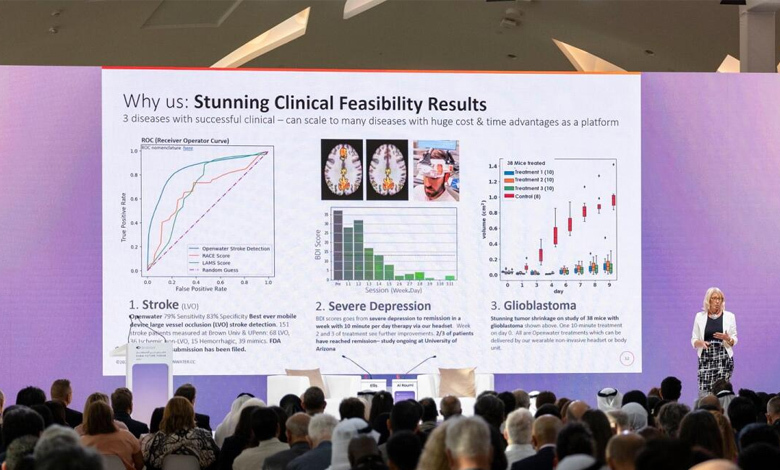No drugs needed for cancer, stroke in the future? New ‘bold’ technology in spotlight at health forum
Dubai recently witnessed a groundbreaking revelation at the Dubai Future Forum, where Dr. Mary Lou Jepsen, a renowned health futurist and CEO of OpenWater, unveiled a pioneering technology set to transform healthcare. This innovative approach combines infrared lights and Moore’s Law to potentially replace drugs in treating up to 90% of diseases, including aggressive cancers, strokes, and depression.
Dr. Jepsen asserted that the integration of software as a form of treatment could reshape the future of healthcare, potentially eliminating the need for traditional hospitals in the years to come. The technology, currently under development by OpenWater, employs imaging techniques using holographic, infrared technology.
Speaking on the sidelines of the forum, Dr. Jepsen highlighted the transformative potential of this technology, envisioning it being scaled down to the size of a smartphone within the next decade. She remarked, “The implications of this technology are pretty profound. Maybe the future of hospitals is that there would be no hospitals. It changes how we approach diseases and cures.”
The foundation of this revolutionary technology lies in the utilization of semiconductors and superelectronics. Dr. Jepsen revealed that advancements in laser technology, with 250,000 lasers in smartphones, have enabled precise measurements of blood flow rivaling million-dollar MRI machines.
Remarkably, the technology has shown promising results in clinical trials. In the case of stroke detection, the wearable device successfully identified symptoms faster than 10 hours, offering a potential lifeline for patients. For depression, patients experienced significant improvements within just one week of a 10-minute therapy session with OpenWater’s headset.
Clinical trials have also demonstrated the technology’s efficacy in treating Glioblastoma, an aggressive form of cancer. A 10-minute treatment using low-intensity light resulted in a substantial reduction in tumor size, showcasing the technology’s potential in targeted cancer cell treatment.
Dr. Jepsen emphasized that OpenWater has managed to keep trial costs up to 10 times lower by sharing safety data across multiple trials. Her commitment to making healthcare more accessible and affordable stems from her background, having co-founded the One Laptop per Child movement, and her experience at Google X, Facebook, and Oculus VR.
As Dr. Jepsen seeks potential partners in the UAE to advance her device into production, she remains confident in the feasibility of her groundbreaking technology. “People think this is impossible,” she stated, “but we are at the Museum of the Future, talking about how to impact the future. So, I am confident I will find someone here who will take this forward.”
This technological breakthrough has the potential to redefine healthcare, offering new possibilities for disease diagnosis and treatment, and sparking hope for a future where traditional medical approaches may no longer be the norm. The convergence of software and healthcare could usher in an era of transformative and accessible medical solutions.
Read More: Beyond the Votes: Unraveling the Dynamics of Expo 2030 Diplomacy


















